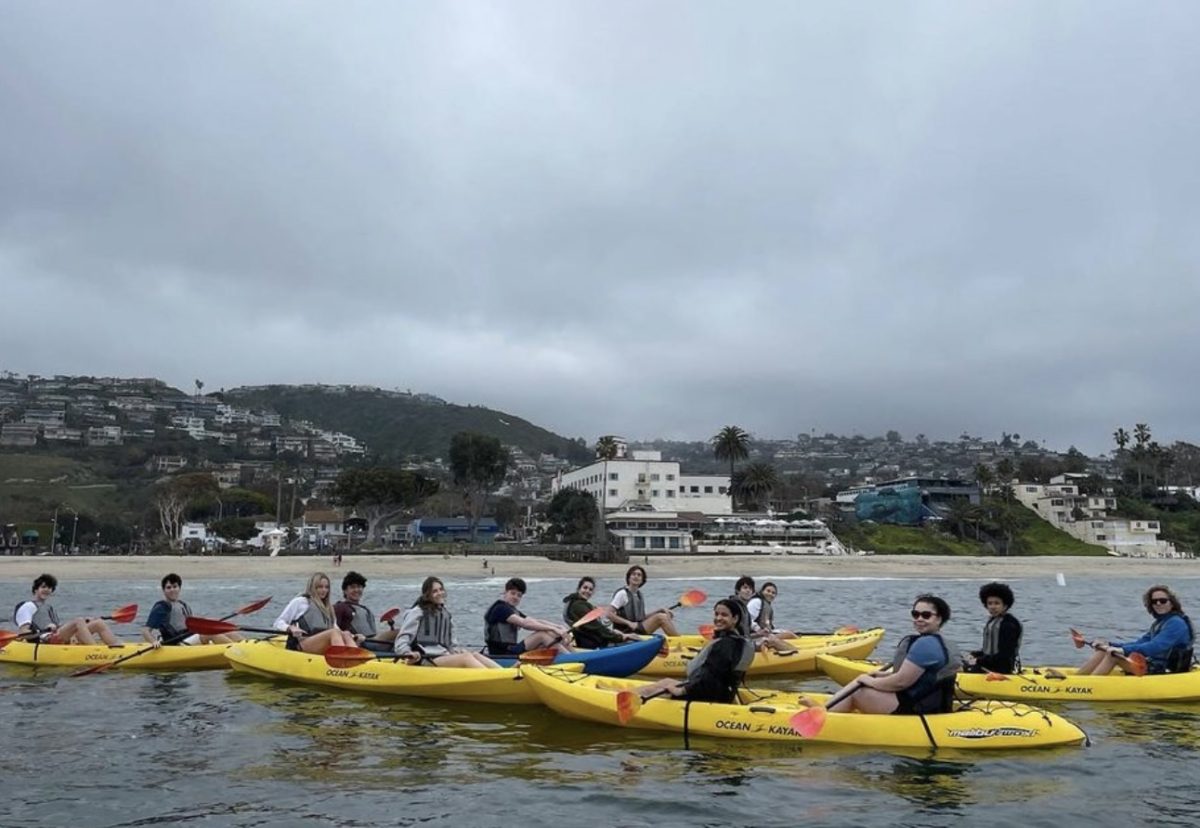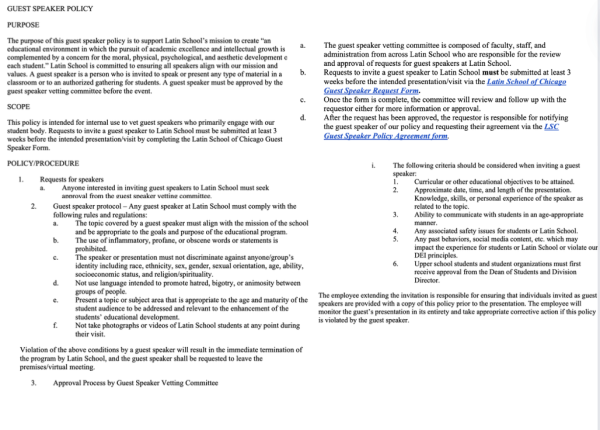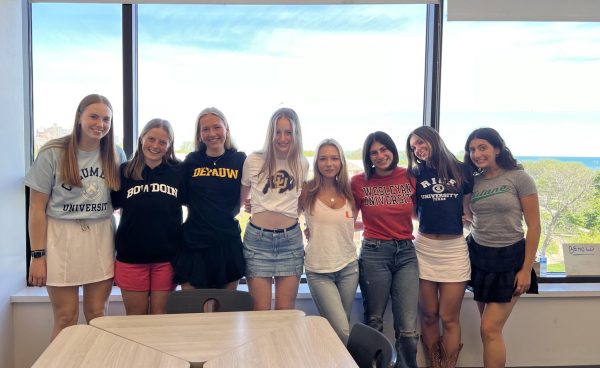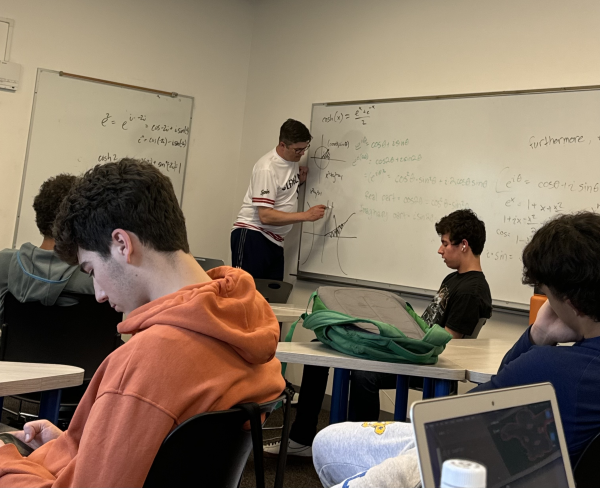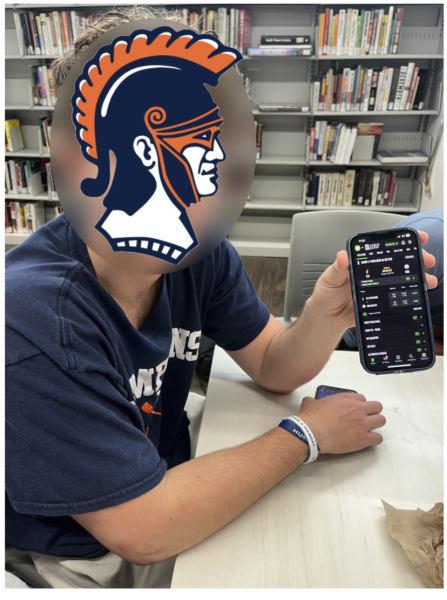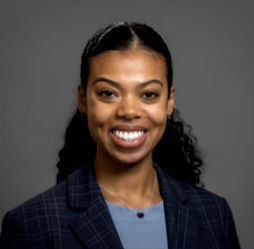Balancing the Scales: The Debate Over P-Week 2024
@latinschoolofchicago on Instagram
Students in the 2023 “Oceanography of Southern California” Project Week pose for a picture while kayaking.
With winter’s chill sweeping through the school, students buzz with the anticipation of Project Week, a time of warmer weather and fewer grade-level sicknesses. From the moment the options for P-Week were announced, Romans browsed through their choices obsessively and prayed for their first pick.
This year, the ratio of in-town to out-of-town projects, combined with the variety of each, sparked a broader argument about what the ideal Project Week catalog should look like. With a variety of opinions on this year’s options, many students wonder what factors go into whether or not projects proposed by faculty are selected.
“We ask [faculty] to provide an experiential learning opportunity, but there’s a lot of freedom for the faculty to explore or share with the community,” Ed Mahoney, Upper School math teacher and one of the Project Week coordinators, said. “So there isn’t a requirement on the type of project other than [that] we use a rubric to judge a project, and they receive that rubric so that there’s understanding of what we’re looking for.”
Mr. Mahoney explained that one underlying issue for projects is the varying costs. “My ultimate goal right now for Project Week is to somehow figure out how to include the cost of Project Week with the tuition, and I think that would solve a lot of problems,” Mr. Mahoney said. His solution consisted of changing the amount of financial aid for students who may be limited in choice due to cost.
One project in particular has resulted in mixed reactions since before the catalog itself was released: the “Band and Chorus Concert Tour,” where students participating in one of these two arts electives travel to Stuttgart, Germany and Salzburg, Austria.
“We were originally supposed to take this trip in the spring of 2020—I feel sorry for the band and chorus students from that year that had their hearts set on going. Unfortunately, COVID shut the school and everything else down around a week before we were supposed to leave,” Cynthia Gradek, Upper School band teacher and a proctor for the project, said. “Mr. Brownlee and I love the fact that we have 100% participation from all band and chorus members, and we are looking forward to sharing this experience with our students.”
While the Band and Chorus project is certainly well-known, the prominence of the Concert Tour affects the offerings in the rest of the catalog.
“Because of the band trip, the choices became a lot more limited, and I don’t think that’s an excuse,” senior Sam Bayer said. “For example, there were no exchanges this year, and this was unexpected for a lot of people who didn’t know that if there was a band trip, there wasn’t going to be an exchange. There were plenty of people that I know of who wanted to go on an exchange senior year, and they were bummed out to find that because of the trip there wouldn’t be any.”
Mr. Mahoney acknowledged that the band and chorus trip created disparities in the number of in-town versus out-of-town projects. “I’m not expecting 50/50 in a year like this year,” he said. “But there are less out of town offerings than in other concert tour years.”
Whereas last year’s catalog featured 16 projects in Chicago and 20 outside of the city, this year’s choices consisted of 20 in-town and 13 out-of-town projects. Not only was the reduction of out-of-town projects significant, but the number of global exchanges only accounted for one P-Week option this year, the Madrid Exchange, which will take place over the summer. While there are still certainly out-of-town selections available, students who have never participated in an out-of-town may not know what they’re missing out on.
“[Going out-of-town] is an experience you don’t really get from being in town because you’re learning to live with people you’ve never met before,” sophomore Tomas Mendoza-Peña, who traveled to California for P-Week last year, said. “It makes you learn how to live with someone you don’t really know and make friends without having the crutch of people you know, whereas in town you get to be with these people throughout the day but after your Project Week you can go hang out with friends.”
However, the support of friends is a tool that students use to make the most out of their Project Week. Especially if a student receives one of their last choices, they can use friends in their project to enjoy what might not have been an ideal situation. Sam said, “I can be assigned to a Project Week with none of my friends or no one I can relate to, and that would make the entire Project Week not so fun at all, so I feel like there needs to be more leniency in how we can coordinate with friends.”
With such a major shift in the ratio of in-town to out-of-town projects, there was not much room to propose certain options. “Compared to last year, a lot of the really well-known projects were taken away, like the Amazing Race, and that was something I wanted to sign up for,” sophomore Vivian Lee-Yee said.
Students’ idea of “well-known” depends on their overall experience with P-Week. When individuals perceive certain projects as popular, they assume that these options will be offered again the following year, which is not always the case. “Since I didn’t really know a lot about Project Week, I thought the majority of them were recurring with some changes; I didn’t know a lot of them changed and some were recurring,” Tomas said.
Ideally, this year’s catalog of projects will build toward a new set of selections favored by students. Freshman Lia Cooper-Ortega explained that a brand-new project became one of her top choices. “The trip to Mexico [seemed] really cool,” she said. “I think it would be really cool to go because I’ve never been, and it’s a part of my heritage as well.”
Not only do students have favorite projects, but faculty and even the coordinators, such as Mr. Mahoney, shared their excitement about some projects that will run for the first time in 2024. “Every year there are projects that kind of bubble up and I think, ‘Oh, that’s going to be really unique,’” Mr. Mahoney said. “The magic one this year is a new project, and I think that’s really fun and kind of shows some of the interests of those faculty members that proposed it.”
He also mentioned the project “So You Think You Want to be an Architect?” “They’re working with a lot of really innovative architecture studios in the city, like a lot of really well-known names, so I think that’s going to be a great project,” he said.
Nevertheless, while the raw number of in-town projects increased, many did not feel that the variety of these options was adequate.
“At least in previous years, and I think in this year as well, some of them are quite similar—it’s either making something or it’s about fitness, and I don’t feel that people are exactly looking for that type of Project Week,” Sam said. “Woodworking, metalworking, jewelry making—there’s a lot of those types of [projects] where you’re not exploring so many concepts; it’s only about one topic, and I feel like a rotation might really help, where one runs every other year.”
“I don’t typically try to regulate [variety].” Mr. Mahoney said. “In the past, there have been several projects that have a similar theme, but typically if there’s a lot of faculty members that have that interest, that often means that there’s a lot of students that have that interest. I remember a couple years ago there were like three or four projects to South America, and we were a little concerned that they would compete against each other, but there’s such a difference in the type of project anyway that it didn’t matter.”
Vivian mentioned that she was limited in a different way when considering her top choices. “There were some when I looked at the smaller rules, it was a no for me; like there were some where you weren’t able to shower for a while.”
Despite some of the critiques students expressed, this year’s catalog addresses niche topics that will create opportunities for students to pursue their interests or pilot in a new one.
In town or out, first choice or last, Project Week 2024 will undoubtedly provide a welcome break from Latin’s typical school year activities. “I think it’s a really fun opportunity to learn things outside of the classroom,” Vivian said. “At school, sometimes you’re kind of stuck to learning in one way and being in a certain place, and learning hands-on is a really good way to learn. And it’s also just fun.”
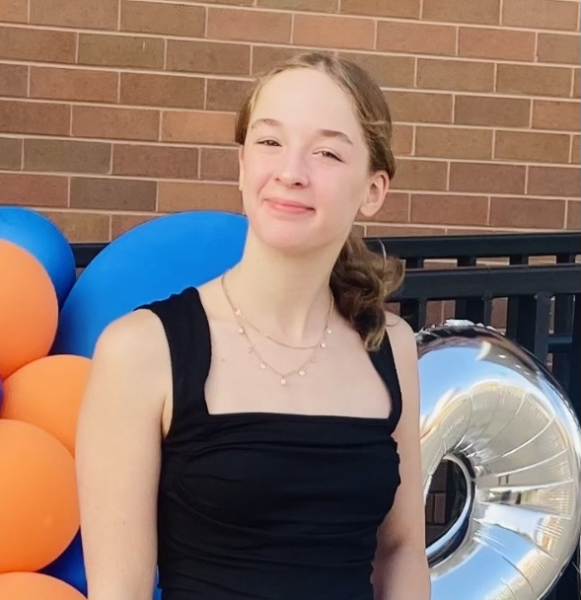
Lucia Meno (’26) is ecstatic for her first year on The Forum. She looks forward to covering stories that dive deeper into Latin-specific customs many...






































